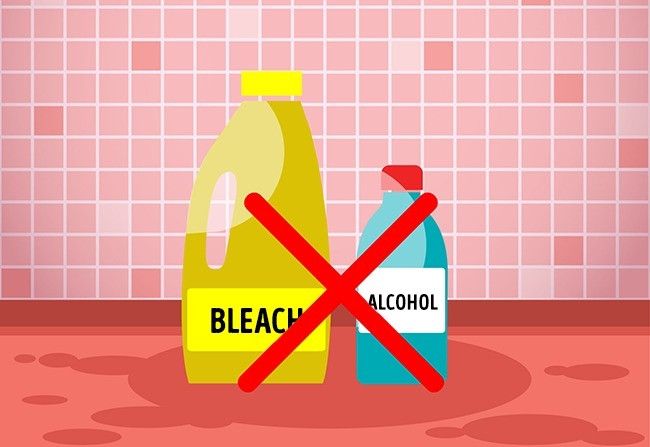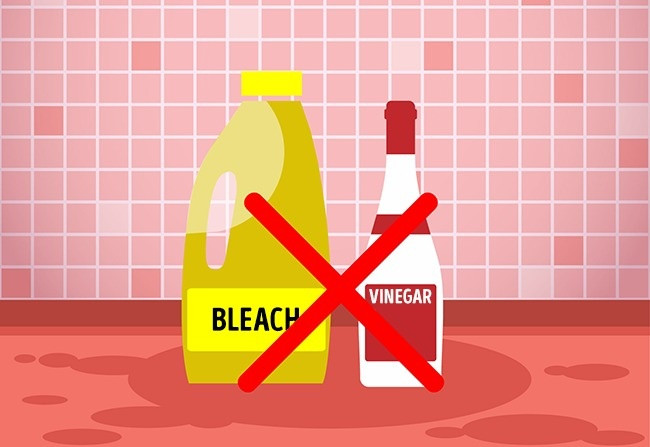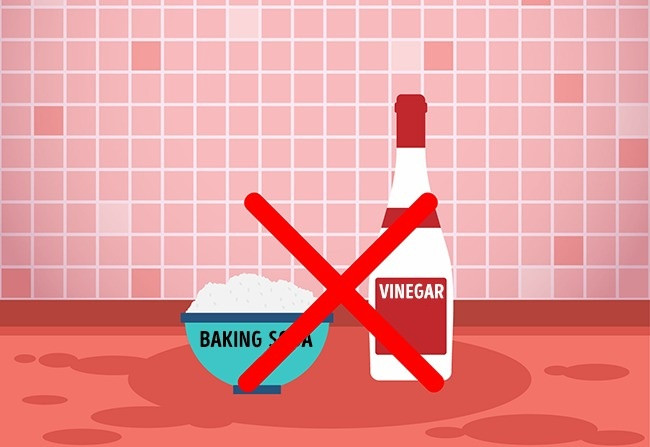7 cleaning products should never be mixed together
When faced with a stubborn stain, you must have thought that if a cleaning product was not effective, mixing another cleaning product would be more effective. This approach is sometimes effective but improper combinations can be dangerous. Because some products are safe only when used separately, when mixed with other products it can cause chemical reactions, endangering your own health and family members. Therefore, read the user guide carefully before use and never mix them, especially mixing the following substances together:
1. Detergents and alcohol

© Freepik
The combination of these two chemical products forms chloroform gas ( making very strong Chloroform gas anesthetic is very dangerous ) and inorganic acid ( HCl ). They can harm the nervous system, lungs, kidneys, liver, eyes and skin. In addition, high levels of chloroform cause dizziness, nausea, loss of consciousness and even death.
2. Detergents and ammonia

© Freepik
Mixtures of detergents and ammonia ( found in some glass cleaners ) when combined will produce chloramine gas which is very dangerous to your health. It produces toxic gases that can cause serious damage to the respiratory system such as difficulty breathing and tightness in the chest. Moreover, high concentrations of ammonia and chloramine ( a highly toxic gas ) also produce a very dangerous explosive. Remember to never combine them with clothes bleach!
3. Detergents and vinegar
 © Freepik
© Freepik
Adding a weak acid to bleach will produce toxic gases that can cause eye burns with serious chemicals and lung damage. Vinegar can be disinfected and cleaned, so it seems that this combination will create a powerful disinfectant and disinfectant. However, you should not mix them together. Otherwise, they will react to produce chlorine gas . Even at low levels, chlorine can cause coughing, shortness of breath, burns and watery eyes.
4. Detergents and other cleaning products
 © Freepik
© Freepik
Household chemical products such as glass toilet cleaners, toilet cleaners and dishwashers should never be mixed with detergents, because it is a combination of chlorine gas production. Even minimal exposure can cause severe breathing and eye problems .
5. Baking Soda (salt medicine) and vinegar

© Freepik
Vinegar is acidic, while baking soda is a weak base, so when mixed together will create exchange reactions, water formation and sodium acetate , but mostly water. This makes cleaning solutions nearly useless. But the most dangerous thing is that vinegar reacts with banking soda to form foam, if stored in a sealed box, the mixture can explode .
6. Vinegar and hydrogen peroxide
 © Freepik
© Freepik
Hydrogen peroxide is another name for old oxygen , which you usually buy at Western drug stores to disinfect and disinfect wounds. Many people also spray this solution and vinegar on fruits to clean and antibacterial. Experts say this method is safe but do not mix the two substances into a mixture. Because this combination will produce peracetic acid, a toxic acid, which can irritate the skin, eyes and respiratory system.
7. Other brand cleaning products
 © Freepik
© Freepik
Surely you never know if the mixture of two different cleaning products will result like that? Remember that every recipe is unique and mixing them together can lead to an uncertain and dangerous chemical reaction.
Safety first! So never forget the following:
- Keep cleaning products, clean in original containers and containers with their original labels.
- Stop using or at least try to use less bleach and ammonia in the home.
- If using bleach or ammonia, be sure to rinse with water.
- Never mix bleach with other household cleaning products.
- Maintain safety standards and always follow manufacturer's instructions.
- Keep all cleaning products out of the reach of children.
Refer to some more articles:
- What actually do we get when purchasing branded packaging products?
- 6 bad things will happen if you regularly skip meals
- 9 habits should be removed immediately if you do not want to be sick when it is cold
Having fun!